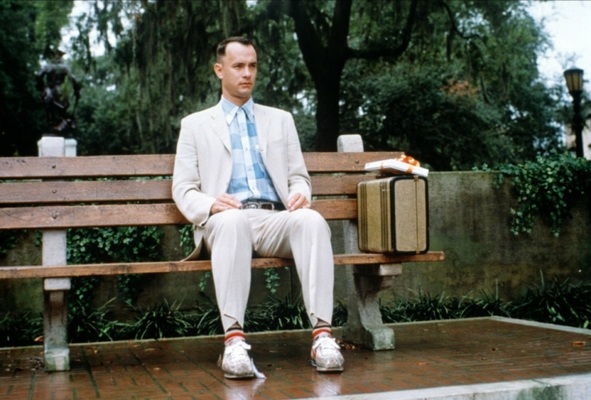|
The Breadcrumbs widget will appear here on the published site.
Oscarbation By Zack Budryk QuailBellMagazine.com There’s a scene in the 2008 comedy Tropic Thunder where Robert Downey Jr.’s character, an acclaimed, award-winning “serious” actor, talks to Ben Stiller’s character, a past-his-prime action star, about Stiller’s attempt to break into prestige pictures, a critical and commercial flop called Simple Jack in which Stiller’s character plays a cognitively-disabled farmhand. “Everybody knows you never go full retard,” Downey Jr. says, comparing Oscar-winning performances like Tom Hanks in Forrest Gump and Dustin Hoffman in Rain Man to Sean Penn’s unrewarded turn in I Am Sam. The scene was met with outcry from disability advocacy groups, but in context it’s making a very important point: to the Hollywood powers-that-be, the disabled are often thought of as people second and opportunities to demonstrate their range first. Over the years, in addition to the performances mentioned, we’ve seen able-bodied Daniel Day-Lewis playing a man with cerebral palsy in My Left Foot, the sighted Ben Affleck playing a blind man in Daredevil and the neurotypical Hugh Dancy playing autistic in both Adam and the NBC series Hannibal. This year alone we’ll also get Eddie Redmayne as Stephen Hawking and Steve Carrell as schizophrenic millionaire John DuPont. And then there’s Hollywood’s other favorite form of disabled erasure, the “metaphor” route: characters like the Incredible Hulk, Elsa from Frozen and Vanellope from Wreck-It Ralph all have conditions that are pretty obviously analogous to real-life disabilities or chronic illnesses, but because they aren’t real conditions, the narrative doesn’t assume any of the risk of discussing those conditions. Similarly, the producers of the TV series Bones and The Big Bang Theory have acknowledged that their main characters display symptoms of Asperger’s syndrome, but said they are unwilling to assume the responsibility of accurately writing an explicitly autistic character. Comparatively, Diane Kruger, who plays an autistic detective on FX’s The Bridge, has consulted extensively with actual autistic people (we can, in fact, speak your human tongue) to improve her performance. It’s not as though disabled actors don’t exist; RJ Mitte, who has cerebral palsy, Jamie Brewer, who has Down’s syndrome, and Russell Harvard, who is deaf, all gave acclaimed performances as characters who shared their disabilities in the series Breaking Bad, American Horror Story and Fargo respectively, and Daryl Hannah, Dan Akyroyd and British character actor Paddy Considine (of The Bourne Ultimatum and Hot Fuzz) have spoken candidly on their autism. The problem, unfortunately, may come down to a reluctance in Hollywood to take a chance on authentically disabled actors when it’s easier to put fake teeth on someone with name recognition (never mind that actors like Al Pacino and Harrison Ford were unknowns when they were cast in the roles that would make them icons). Christopher Shinn speculates in The Atlantic that audiences are more comfortable seeing an impression of a disabled person than the genuine article, citing disabled playwright John Belluso’s theory that, in Shinn’s words, “there is a collective ‘Phew’ as people see it was all an illusion. Society’s fear and loathing around disability, it seems, can be magically transcended.” No matter how much research and preparation an actor does, Shinn reminds us, everything that goes into their portrayal of disability—even a committed, respectful performance like Kruger’s—comes from secondhand sources, not actual experience (to hastily craft an analogy, which feels more authentic—cis man Jared Leto’s portrayal of a trans woman in Dallas Buyers’ Club, or trans woman Laverne Cox’s portrayal of same in Orange is the New Black?) As is often the case when we discuss such matters, certain abled people will roll their eyes and snidely tell you that “it’s called acting,” as though that were the point. I’m not out to suggest that no abled people should ever play disabled people, but it’s also pretty unreasonable that, with the abundance of portrayals of disability, disabled actors are still obscure enough that I have to identify most of them with a parenthetical about their most famous work in writing this piece (and one wonders how many potential talents have been discouraged from further pursuing acting based on how seldom they see an actor like them onscreen). If it’s all about “the best actor for the job” (another common refrain), I eagerly await an outpouring of disabled actors playing abled characters, with critical notices about how “brave” the performance is. Unless, of course, you just mean to imply that abled actors are just uniformly superior actors to disabled ones. Which would make you kind of an asshole. #Real #Disabilities #Handicapped #ActingTechniques #CastingIssues #HollywoodSucks #MovieIndustry #Television Visit our shop and subscribe. Sponsor us. Submit and become a contributor. Like us on Facebook and follow us on Twitter. CommentsComments are closed.
|
|









